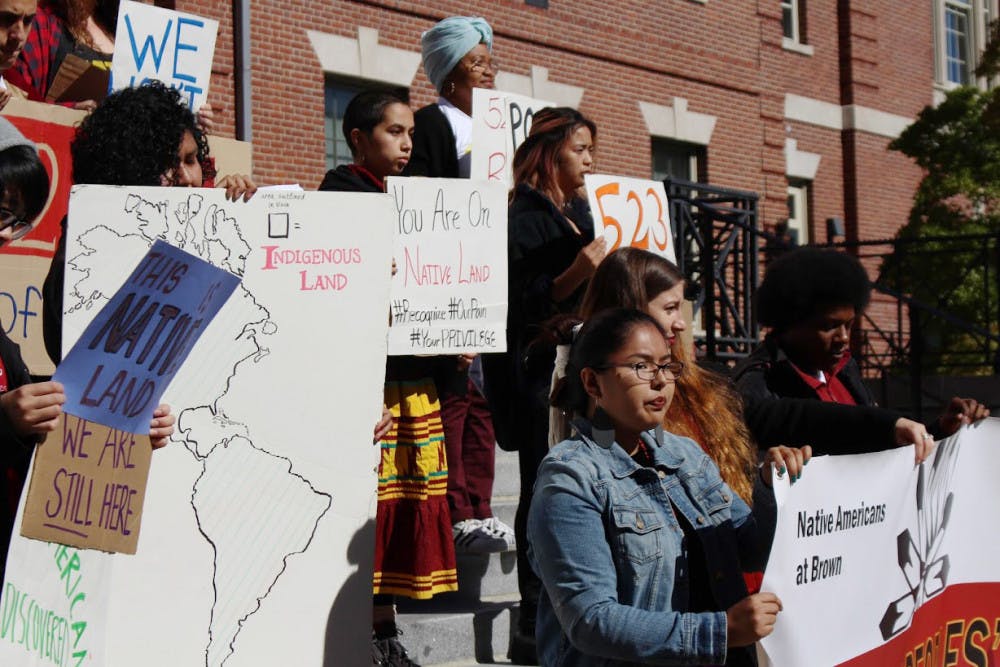On Brown’s inaugural Indigenous People’s Day Monday, Native Americans at Brown hosted a celebration on the Main Green that commemorated past activism and called for additions to current support structures for Native American and Indigenous students.
Attended by students, faculty members, alums and administrators, the event was an opportunity to look back on past struggles while also looking forward to greater recognition of Native American people, especially of local nations such as the Narragansett Indian Tribe and the Wampanoag Tribe.
“We’ve been here, we are here, and we will always be here. Today, we celebrate that together,” said Ruth Miller ’19, one of the co-organizers of the event.
To begin the celebration, students reenacted last year’s protest, which urged the University to change the name of Fall Weekend to Indigenous People’s Day. The new name was formally adopted in February after a faculty vote.
Assistant Professor of American Studies Elizabeth Hoover MA’03 PhD’10 welcomed event attendees with a brief history of campus activism recognizing Native American people, ending her remarks by urging the audience not to become complacent.
A documentary detailing the narrative of Native American and Indigenous students and faculty members at the University was shown. Sierra Edd ’18, who directed the film, emphasized that its purpose was not only to preserve university memory — which is particularly short given that students graduate after four years — but also to tell the narrative from a Native American’s perspective.
The film shared the experiences that Native American students and faculty members encountered on campus, focusing on the demonstration and die-in that took place last fall in response to The Herald’s publication of two racist opinions columns. The film acknowledged the support from other communities of color on campus after the publication. The documentary highlighted the lack of representation of Native American students on campus, which stands at less than 1 percent, according to the documentary. The documentary also cautioned against allowing a rich legacy of work and activism to die out, highlighting the many unmet demands of NAB.
A panel discussion on the Native American and Indigenous Studies Initiative followed, highlighting the efforts that students and the University are taking to ensure support for Native American students and Native American and Indigenous studies.
Adrienne Keene, assistant professor of American studies, compared the efforts at Brown to those undertaken by peer institutions, such as a dedicated center for Native American people at Yale and a Native American program that serves as an interdisciplinary research hub at Harvard.
Panelists also listed the current resources the University has for Native American studies, such as collections at the John Carter Brown Library, academic centers and collaborations with outside scholars.
But panelists and audience members noted the University should not simply copy peer institutions in efforts to support Native American people at Brown.
Renee Neely ’12 doesn’t want Brown to “be a clone of Harvard,” but instead to be a “humanitarian vanguard,” she told The Herald. She expects the University to be the “out-of-the-box Ivy” when it comes to recognizing Native identities on campus, she added.
Efforts are being made to increase admission outreach both locally and nationally, said Niyolpaqui Moraza-Keeswood ’16, a coordinator for Native American and Indigenous studies. Moraza-Keeswood has been working with the Admission Office to recruit Native American students locally, while Keene anticipates bringing College Horizons, a college admission workshop for Native students, to campus in 2018.
Geri Augusto, visiting associate professor of international and public affairs and Africana studies, said that while the University is known for producing scholarly works, it should also be known for producing scholars, which requires thinking of the “Native American scholar as (a) human being” and supporting the whole person, both mentally and psychologically.
“You’re not just minimally responsible for what (Native American scholars) produce and write, but also for how they think,” Augusto added.
Miller hopes that people will not only celebrate the increased visibility of Native American people on campus, but also realize that there is work to be done so that people are not “willfully ignorant” of the role of the systematic oppression of Native American people in America’s history, she told The Herald.
“Our identities matter,” Miller said, “and they are relevant not only to our own campus but also to everyone’s presence here.”
The event was sponsored by the Native American and Indigenous Studies Initiative, the President’s Office, the Provost’s Office, the Office of Institutional Diversity and Inclusion, the Office of Campus Life and Student Services, the Swearer Center for Public Service, the department of history and the Native American Heritage Series.





